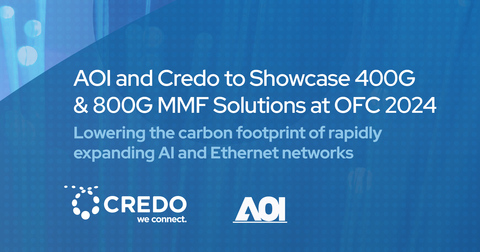AOI and Credo to Showcase 400G and 800G MMF Solutions at OFC 2024
Lowering the carbon footprint of rapidly expanding AI and Ethernet networks

AOl and Credo to Showcase 400G & 800G MMF Solutions at OFC 2024. Visit us in Booth 3601 at OFC. (Graphic: Business Wire)
“AOCs and multimode transceivers are an integral part of AI and Ethernet networks, as an interconnect between the GPU server, and leaf and spine switches,” said Dr. Fred Chang, SVP and GM from AOI. “With the rapid build-out of greenfield AI networks and the expansion of existing infrastructure, there is an urgent need to reduce network power dissipation and cost of ownership, while ensuring overall network robustness. AOI’s new 400G and 800G designs, featuring the Credo Seagull 452 and Dove 800 DSPs, take advantage of the latest technologies available on the market to address these challenges.”
“Credo’s Seagull 452 was designed from the ground up with the sole focus of creating an optimized 400G AOC solution,” said Chris Collins, Credo’s Vice President of Sales and Optical Product Marketing. “In addition, the Dove 800 is a fourth generation DSP offering a world class combination of power and performance needed to ensure robust 800G connections. With the growing number of Ethernet links in both frontend and backend AI networks, there is a clear industry need to push the envelope on performance, energy efficiency, and system cost. These new designs from AOI are a real home run for datacenter operators seeking to optimize next generation connectivity.”
Availability
Samples of the AOI 400G QSFP-DD AOC are available for immediate shipment.
About the Credo Seagull 452
The Seagull 452 DSP is an 8 x 50Gbps PAM4 DSP with integrated VCSEL drivers. It boasts exceptionally low-power consumption while incorporating Credo’s fourth generation DSP technology on both the electrical host and optical interfaces. This allows for extended host side reach supporting seamless operation over short and long PCB channels beyond the VSR specifications eliminating any manual tuning. On the optical side, the latest performance enhancements allow customers to relax the optical component specifications, thereby increasing manufacturing yields and lowering the overall transceiver cost. When paired with the Credo Teal 200 4 x 50Gbps TIA, Seagull 452 enables a complete 400G AOC or 400G SR8 transceiver solution offering enhanced performance, exceptionally low power, and optimized cost.
About the Credo Dove 800
The Dove 800 is a fourth generation, low-power, high-performance 8 x 100Gbps PAM4 DSP for 800G transceiver and AOC designs. The optical receive interface incorporates unique reflection cancellation and non-linear compensation features to ensure optimal link performance with a wide range of optics. The host interface supports PCB channels beyond the VSR specifications to eliminate any manual turning with different host platforms. Dedicated PLLs are included for each transmit and receive data lane enabling seamless operation in breakout applications. On-chip crossbar, performance monitors, loopbacks and link analysis simplify module design, bring-up, and production testing for all Dove 800 designs.
About Credo
Our mission is to deliver high-speed solutions to break bandwidth barriers on every wired connection in the data infrastructure market. Credo is an innovator in providing secure, high-speed connectivity solutions that deliver improved power efficiency as data rates and corresponding bandwidth requirements increase exponentially throughout the data infrastructure market. Our innovations ease system bandwidth bottlenecks while simultaneously improving on power, security, and reliability. Our connectivity solutions are optimized for optical and electrical Ethernet applications, including the emerging 100G (or Gigabits per second), 200G, 400G, 800G and the emerging 1.6T (Terabits per second) port markets. Credo products are based on our proprietary Serializer/Deserializer (SerDes) and Digital Signal Processor (DSP) technologies. Our product families include Integrated Circuits (ICs) for the optical and line card markets, Active Electrical Cables (AECs) and SerDes Chiplets. Our intellectual property (IP) solutions consist primarily of SerDes IP licensing.
For more information, please visit https://www.credosemi.com. Follow Credo on LinkedIn.
About AOI
Applied Optoelectronics Inc. (AOI) is a leading developer and manufacturer of advanced optical products, including components, modules and equipment. AOI’s products are the building blocks for broadband fiber access networks around the world, where they are used in the internet datacenter, CATV broadband, telecom and FTTH markets. AOI supplies optical networking lasers, components and equipment to tier-1 customers in all four of these markets. In addition to its corporate headquarters, wafer fab and advanced engineering and production facilities in
View source version on businesswire.com: https://www.businesswire.com/news/home/20240325102263/en/
Media Contact:
Diane Vanasse
diane.vanasse@credosemi.com
Investor Contact:
Dan O’Neil
dan.oneil@credosemi.com
Source: Credo Technology Group Holding Ltd







